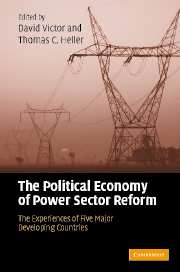Book contents
- Frontmatter
- Contents
- List of figures
- List of tables
- Notes on contributors
- Preface
- 1 Introduction and overview
- 2 Political economy of the Brazilian power industry reform
- 3 Reform of the Chinese electric power market: economics and institutions
- 4 The political economy of Indian power sector reforms
- 5 The Mexican Electricity Sector: economic, legal and political issues
- 6 The political economy of power sector reform in South Africa
- 7 Major conclusions: the political economy of power sector reform in five developing countries
- Bibliography
- Index
6 - The political economy of power sector reform in South Africa
Published online by Cambridge University Press: 22 September 2009
- Frontmatter
- Contents
- List of figures
- List of tables
- Notes on contributors
- Preface
- 1 Introduction and overview
- 2 Political economy of the Brazilian power industry reform
- 3 Reform of the Chinese electric power market: economics and institutions
- 4 The political economy of Indian power sector reforms
- 5 The Mexican Electricity Sector: economic, legal and political issues
- 6 The political economy of power sector reform in South Africa
- 7 Major conclusions: the political economy of power sector reform in five developing countries
- Bibliography
- Index
Summary
Introduction
The dominant trend in the evolution of the power sector in South Africa over much of the last century was the growth and consolidation of a large and powerful state-owned, vertically integrated monopoly, Eskom. Most of the early private power producers were gradually taken over by Eskom, which became responsible for new supply. The main drivers for the increased concentration and public ownership of the industry were potential economies of scale in power plants, the requirement for large amounts of capital that could be facilitated by government guarantees, and the fact that electricity was seen as an essential ingredient of the government's industrialization strategy. At the same time, the state was also assuming a dominant role in other key infrastructure industries, including rail, air, and sea transport, telecommunications, water, coal-based synthetic fuels, nuclear energy, and also the iron and steel industry. Competition and private ownership in these sectors were thought to be non-optimal; the state viewed these industries as key instruments for industrialization, employment creation, and economic development.
However, by the 1980s poor economic performance of state-owned enterprises (SOEs), combined with broader economic and political pressures on the apartheid state, caused government to look at reforming these institutions. The management of Eskom was not fully accountable but could plan and finance excessive generation capacity. Poor investment decisions were made. The result was massive costs to the economy and, initially, to the consumer as well. At the same time, the vast majority of disenfranchised South Africans remained without electricity.
- Type
- Chapter
- Information
- The Political Economy of Power Sector ReformThe Experiences of Five Major Developing Countries, pp. 215 - 253Publisher: Cambridge University PressPrint publication year: 2007
- 15
- Cited by



